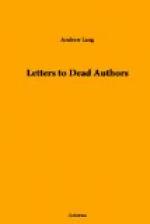Unhappily, taste and circumstances combined to make you a censor; you vexed a continent, and you are still unforgiven. What ’irritation of a sensitive nature, chafed by some indefinite sense of wrong,’ drove you (in Mr. Longfellow’s own words) to attack his pure and beneficent Muse we may never ascertain. But Mr. Longfellow forgave you easily; for pardon comes easily to the great. It was the smaller men, the Daweses, Griswolds, and the like, that knew not how to forget. ‘The New Yorkers never forgave him,’ says your latest biographer; and one scarcely marvels at the inveteracy of their malice. It was not individual vanity alone, but the whole literary class that you assailed. ‘As a literary people,’ you wrote, ‘we are one vast perambulating humbug.’ After that declaration of war you died, and left your reputation to the vanities yet writhing beneath your scorn. They are writhing and writing still. He who knows them need not linger over the attacks and defences of your personal character; he will not waste time on calumnies, tale-bearing, private letters, and all the noisome dust which takes so long in settling above your tomb.
For us it is enough to know that you were compelled to live by your pen, and that in an age when the author of ‘To Helen’ and’ The Cask of Amontillado’ was paid at the rate of a dollar a column. When such poverty was the mate of such pride as yours, a misery more deep than that of Burns, an agony longer than Chatterton’s, were inevitable and assured. No man was less fortunate than you in the moment of his birth—infelix opportunitate vitae. Had you lived a generation later, honour, wealth, applause, success in Europe and at home, would all have been yours. Within thirty years so great a change has passed over the profession of letters in America; and it is impossible to estimate the rewards which would have fallen to Edgar Poe, had chance made him the contemporary of Mark Twain and of ‘Called Back.’ It may be that your criticisms helped to bring in the new era, and to lift letters out of the reach of quite unlettered scribblers. Though not a scholar, at least you had a respect for scholarship. You might still marvel over such words as ‘objectional’ in the new biography of yourself, and might ask what is meant by such a sentence as ’his connection with it had inured to his own benefit by the frequent puffs of himself,’ and so forth.
Best known in your own day as a critic, it is as a poet and a writer of short tales that you must live. But to discuss your few and elaborate poems is a waste of time, so completely does your own brief definition of poetry, ’the rhythmic creation of the beautiful,’ exhaust your theory, and so perfectly is the theory illustrated by the poems. Natural bent, and reaction against the example of Mr. Longfellow, combined to make you too intolerant of what you call the ‘didactic’ element in verse. Even if morality be not seven-eighths of our life (the exact proportion as at present estimated), there was a place even on the Hellenic Parnassus for gnomic bards, and theirs in the nature of the case must always be the largest public.




